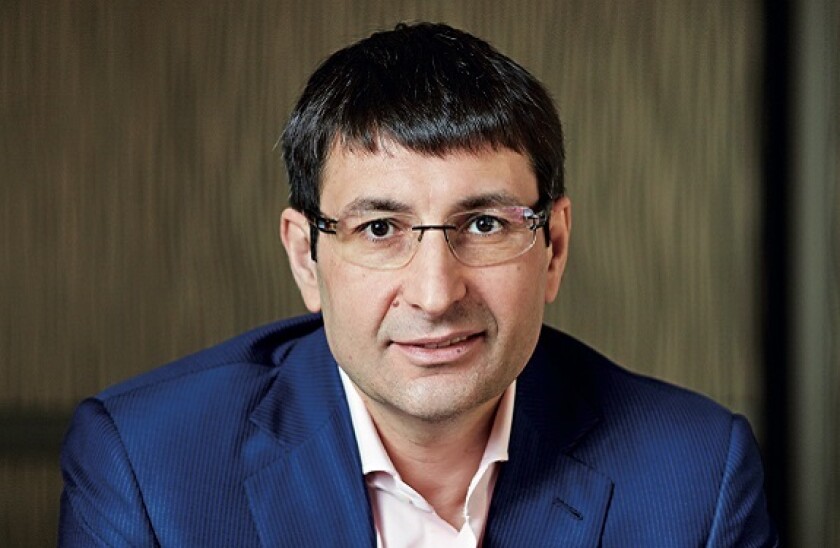The bank has grown from being primarily a consumer lender to a full service bank with over Rub1.6tr of assets on its balance sheet.
In the past few years it has also become Russia’s dominant player in the buy-now/pay-later market through its Halva instalment product and this year expanded its footprint in non-banking areas of financial services by acquiring the Russian divisions of MetLife and Liberty Insurance Company.
With an IPO possible, investors have a keen eye on Sovcombank going into 2021, which is already expected to be a strong year for Russian equity issuance.
The bank’s CEO Dmitry Gusev sat down with GlobalCapital this week to talk through the bank’s recent growth and the revitalisation of Russia’s economic prospects.
GlobalCapital: Can you talk through Sovcombank’s underlying business growth over the last few years?
DG: In 2018 and 2019, we made our last transformative acquisition when we acquired RosEvroBank, finalising our transition into a universal bank in Russia. We now offer all services and products that consumers expect from a retail and corporate bank.
I’d still say that within each sector, we try to specialise within niches where we have or can create strong and even unique competitive advantages. One excellent example is our disruptive product Halva, Russia’s largest instalment payment system, which we launched in 2017. We now have more than 20% of all retail shops in Russia within the system. Halva has shown significant growth in assets and net income in the retail business over three consecutive reporting periods, with huge potential for further expansion due to rising demand among customers for a buy-now/pay-later product.
We have also been expanding outside of banking into the broader financial services space. For example, we recently completed the acquisition of the Russian operations of MetLife and Liberty Insurance Company.
GlobalCapital: Can you talk through Sovcombank’s equity progression including your previous investment rounds, and how the company sees itself as an investment opportunity? What are the benefits of investing in Russia’s third largest privately-owned bank?
DG: We have had a history of equity investments spanning many years. The equity rounds in 2018 and 2019 involved international investors. We have always had very strong internal capital generation, but by also successfully raising external funds we have been able to pursue multiple M&A deals which have substantially accelerated our growth.
Today this puts us in an ideal position, as we have achieved what we refer to as ‘smart scale’. On the one hand, we are big enough now not to have any competitive disadvantages against others in the sector. We are a systemically important financial institution in Russia and now have the highest credit rating available to private banks in the country, having recently been upgraded to ‘sovereign minus one’. We also have sufficient scale to invest in IT, in new businesses and in creating ambitious new products.
On the other hand, we are not too big, meaning that it’s easier for us to adapt to changing market dynamics and to find and develop very profitable niches within our core market. In a market that is largely controlled by state-owned banks, we are able to protect our current market share and to maintain a very high pace of growth.
I would also point out that a significant proportion of shareholders are also managers of the bank and have been for many years, some of them for 20 years. This is very important as it creates strong alignment between the interests of our shareholders and of management.
GlobalCapital: Why is now a good opportunity for Sovcombank to consider going public? What is the market like for potential IPO sellers?
DG: What we have seen recently is that there is strong demand for high quality growth stories from Russia. But as far as Sovcombank is concerned, an IPO is just one of the strategic options we may consider, and at this stage it would be premature to discuss any specifics.
GlobalCapital: Why should foreign investors look to dedicate capital to Russia and what are the things that make the Russian market special?
DG: Many outside investors believe growth in Russia has been anaemic for the past few years, however, we have a different view. Fifteen years ago, Russia’s oil price was $140 per barrel and the country was facing huge sovereign debt. Now, oil is $40 per barrel, but Russia’s debt has been reduced to almost zero, creating perfect conditions for very rapid growth.
Now, I would agree that the Russian economy is very volatile, but the country has increased its self-sufficiency in the past several years, helping it to absorb international shocks, and to create the conditions that have enabled rapid growth in various sectors of the economy. We believe that foreign investors have started to realise this.
It’s also worth noting that while Russia was of course deeply impacted by the pandemic, this year we also saw a lot of innovation, the unemployment rate was consistently very moderate, and the economy overall adapted very quickly to the effects of Covid-19.

